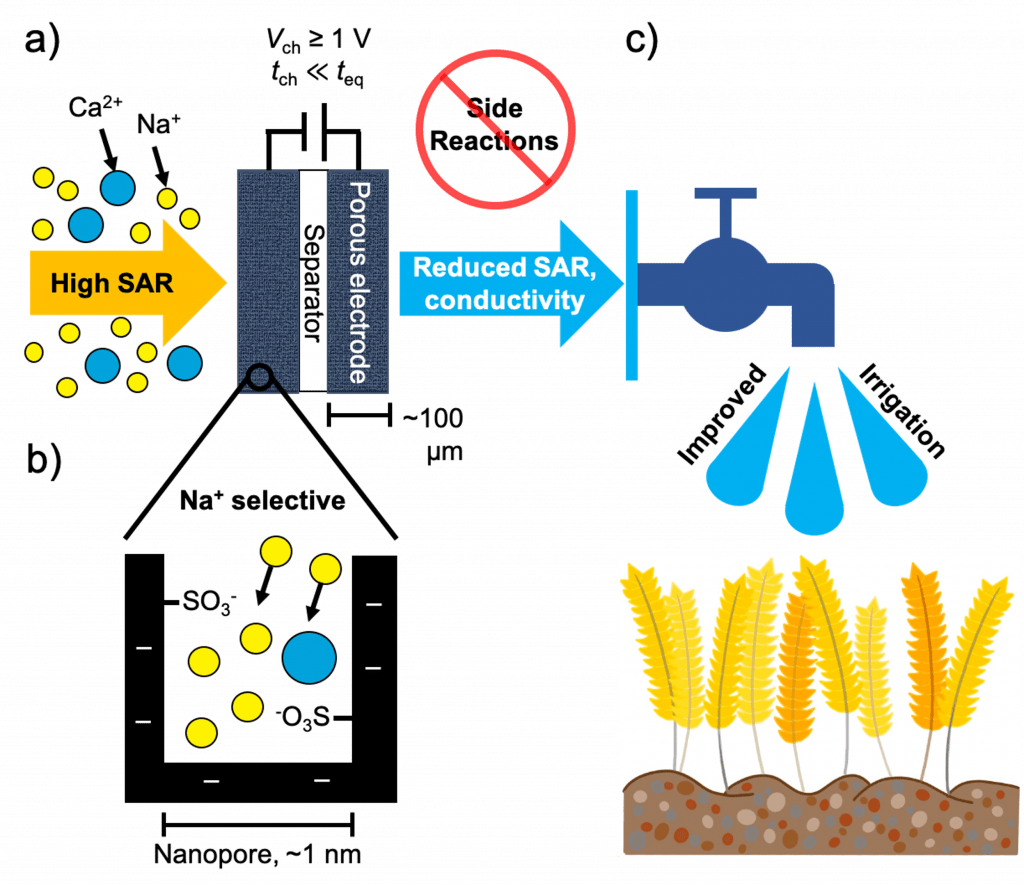Smart Water Purification
Technion Scientists Find Way to Improve Water Purification Technology
Agricultural irrigation accounts for 80 percent of water usage in the United States. In Israel, the number is just under 60 percent. With water being a finite resource, the use of recycled water for irrigation is a significant contributor to water conservation. As part of the purification process necessary in order to safely use recycled water for irrigation, excess sodium should be removed, but some minerals, such as calcium and magnesium, should be retained.
A high ratio of sodium to calcium and magnesium, also known as Sodium Absorption Ratio, adversely affects soil permeability, negatively impacts water infiltration rate, and damages crops. Over time it can cause the salinization of the soil, and such damage can be hard to reverse. Modern methods of water purification are either non-selective, removing wanted minerals and unwanted salts alike and requiring subsequent remineralization of the water; or expensive and not tunable (i.e., they cannot be dynamically adjusted for different feedwater inputs or for changing effluent requirements).
Capacitive deionization is a novel water treatment technology that aims to improve precisely on this non-selectivity. Capacitive deionization uses two electrodes, which are often made from activated carbon, an inexpensive and widely available material. Applying electric charge to the electrodes causes salts and minerals in the feedwater to migrate into the electrodes and collect in nanopores on them – essentially in microscopic content-specific pockets. When these “pockets” are full, reversing the charge empties them out, and the electrode is ready for use again. The problem with this method is that the electrodes wear out quickly.
A breakthrough was recently achieved by Professor Matthew Suss of the Technion Faculty of Mechanical Engineering and Wolfson Department of Chemical Engineering, and his team (Ph.D. students Eric Guyes and Amit Shocron, and master’s student Yinke Chen), in collaboration with Professor Charles Diesendruck of the Technion’s Schulich Faculty of Chemistry, whose main interests are water desalination and energy conservation.
In the team’s system, water flows through two porous electrodes. By sulfonating one of the electrodes – that is, executing a chemical reaction that is cheap and easy to perform – the team was able to produce a capacitive deionization cell that proved effective in reducing the Sodium Absorption Ratio of the feedwater, giving significantly better results than cells with electrodes that were not similarly treated. The electrode was also much more stable than what has previously been described. The team ran 1000 cycles of water treatment through it, without the electrode showing significant deterioration – a record cycle life for a cell of this type.
The process was energetically efficient, and the efficiency can be improved further using already existing methods. The system is also easily tuneable. By changing the voltage and the charging time of the electrodes, different results can be obtained, making the method applicable to various uses, including irrigation and more. The findings could lead to a number of practical applications, since the team managed to improve on all aspects of water purification systems that continue to pose a challenge.
Click here for the paper in Clean Water

CDI concept for direct agricultural irrigation water treatment. a) A CDI cell is fed with water containing excessive sodium (Na+), which must be treated for direct use in irrigation. b) The cell contains an electrode with sulfonic (SO3-) groups and is charged for a short time, which enhances the preferential storage of sodium over calcium (Ca2+). c) The treated water has significantly reduced sodium content and conductivity, rendering it suitable for direct use in irrigation.


